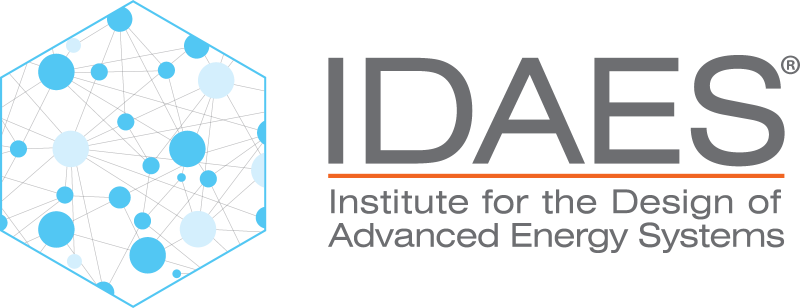Configuration#
Some behavior of IDAES is configurable through the IDAES global ConfigBlock.
IDAES’s configuration is obtained by first setting everything to internal
defaults; then loading a global config file, if it exists; then loading a config
file from the current working directory, if it exists. After the idaes
module is imported, the idaes ConfigBlock can be accessed at idaes.cfg.
Some configuration options can be changed after importing idaes by calling
idaes.reconfig().
Configuration files are in JSON format.
The default configuration is shown below and can be used as a template to create
new configuration files. To get the IDAES default configuration the command
idaes config-write --file idaes.conf --default can be used.
Global Configuration Files#
IDAES configuration files are named idaes.conf. The easiest way to find
where the global configuration file should be placed is to run the command
idaes data-directory. A global configuration file won’t exist unless a
user creates one. The default configuration above can be used as a start.
Windows#
On Windows the global configuration file is located at
%LOCALAPPDATA%\idaes\idaes.conf.
UNIX-Like#
On Unix-like systems the global configuration files is located at
$HOME/.idaes/idaes.conf.
Other#
On systems that have neither an %LOCALAPPDATA% or $HOME environment
variable, global config files are not currently supported.
Local Configuration Files#
Local configuration files are also named idaes.conf and can be placed in the
working directory, which is the directory you launch Python from. You can also
use the Python command chdir() to change the working directory before
importing idaes.
In addition to reading local configuration files when idaes is imported, you
can read a configuration file anytime by calling idaes.read_config(path).
Reading a configuration file will automatically apply any resulting
configuration changes.
Changing the Configuration in a Script or Interactive Session#
The idaes configuration can be changed anytime after the idaes module is
imported. The standard ConfigBlock options are described in detail below. For
example to change whether you want to use the solvers provided by idaes or ones
you have installed elsewhere, you would first use the command
idaes.cfg["use_idaes_solvers"] = False then to make the change take effect
use idaes.reconfig(). Not all option changes require idaes.reconfig(),
so whether they do or don’t is provided in the options descriptions below.
Important Configuration Entries#
The ConfigBlock has several options, but they are not all important to end-users. This section lists the commonly used entries.
warning_to_exception#
If this option is True, any log messages at level warning or above will be converted to a RuntimeError exception. This can be used to ensure a model doesn’t generate warnings. It can also be used to generate a traceback for warnings, which can provide additional debugging information.
Changes require idaes.reconfig(). The default setting is False.
depracation_to_exception#
If this option is True, any log messages at level warning or above that contain “deprecation,” “deprecate,” or “deprecated” will be converted to a RuntimeError exception. This can be used to ensure a model doesn’t use any deprecated models or methods.
Changes require idaes.reconfig(). The default setting is False.
use_idaes_solvers#
This option can be set to False (false in JSON) to direct the IDAES
framework not to use solvers obtained with the idaes get-extensions command
before using the solvers that may have been otherwise installed by the user.
This can be used if a user would prefer to use solver versions they have
installed apart from IDAES.
Changes require idaes.reconfig(). The default setting is True.
logger_capture_solver#
If a solver call is done from inside a solver logging context, this setting will
send the solver output to the logger if True, and not capture the solver output
for the logger if False. If solver output is not captured it will be sent to
the screen, and not be logged.
Changes do not require idaes.reconfig(). The default setting is True.
ipopt#
This is a config block that provides default configuration for the ipopt solver.
These options are used for ipopt solvers by default when the IDAES SolverFactory
wrapper is used. Currently only solver options can be configured in the options
sub-ConfigBlock.
For example to set the default NLP scaling method for ipopt to use idaes-provided
scaling factors, use the command
idaes.cfg["ipopt"]["options"]["nlp_scaling_method"] = "user-scaling"
Any ipopt solver options that can be passed via command line argument to the ipopt
AMPL executable solver can be set under idaes.cfg["ipopt"]["options"]
or equivalently in a configuration file.
Changes do not require idaes.reconfig(). The default options are:
{"nlp_scaling_method": "gradient-based"}.
